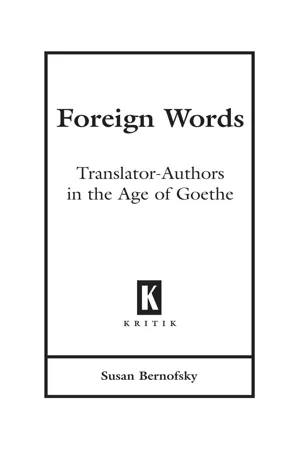
- 252 pages
- English
- ePUB (mobile friendly)
- Available on iOS & Android
About This Book
A new perspective on the principal developments in translation practice and theory in Germany during the Age of Goethe with emphasis on the work of Goethe, Hölderlin, and Kleist as translators.
The turn of the nineteenth century was a particularly fertile period in the history of translation theory and practice. With an unprecedented number of works being carefully translated and scrutinized, this era saw a definite shift in the dominant mode of translation. Many translators began attempting, for the first time, to communicate the formal characteristics, linguistic features, and cultural contexts of the original text while minimizing the paraphrasing that distorted most eighteenth-century translations. As soon as these new rules became the norm, authorial translators—defined not by virtue of being authors in their own right but by the liberties they took in their translations—emerged to challenge them, altering translated texts in such a way as to bring them into line with the artistic and thematic concerns displayed in the translators' own "original" work. In the process, authorial translators implicitly declared translation an art form and explicitly incorporated it into their theoretical programs for the poetic arts.
Foreign Words provides a detailed account of translation practice and theory throughout the eighteenth and early nineteenth centuries, linking the work of actual translators to the theories of translation articulated by Goethe, Wilhelm von Humboldt, and, above all, Friedrich Schleiermacher. Employing a variety of critical approaches, author Susan Bernofsky discusses in depth the work of Kleist, Hölderlin, and Goethe, whose virtuoso translations raise issues that serve to delineate a theory of translation that has relevance at the turn of the twenty-first century as well. Combining a broad historical approach with individual readings of the work of several different translators, Foreign Words paints a full picture of translation during the Age of Goethe and provides all scholars of translation theory with an important new perspective.
Frequently asked questions
Information
Table of contents
- Cover Page
- Title Page
- Copyright Page
- Dedication
- Contents
- Preface
- 1 From Homer to Shakespeare: The Rise of Service Translaiion in toe Late Eightoenih Centoru
- 2 The Translation as a Doppelgänger: amphitryon by Moliere and Hleisl
- 3 Hölderlin as Translator: The Perils of Interpretation
- 4 The Paradox of the Translator: Goethe and Diderot
- Coda: From the Nineteenth to [he Twenty-First Century.
- Abbreviations
- Notes
- Bibliography
- Index